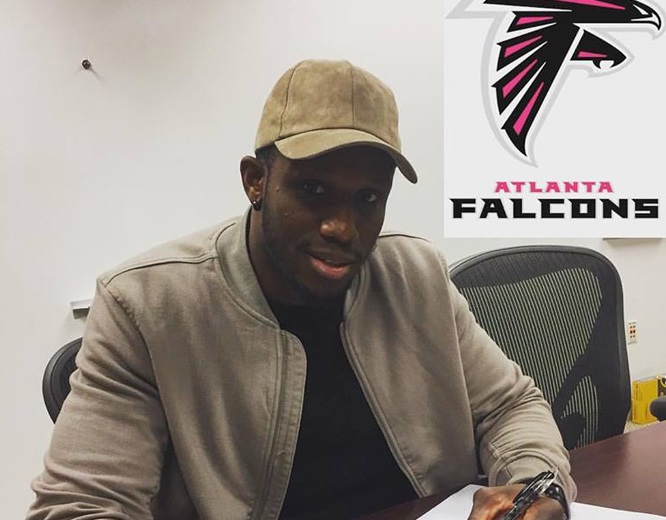According to Touchdownactu.com and NFL France, French wide receiver Anthony Dablé has signed a futures contract with the Atlanta Falcons. Any player who is an unrestricted free agent or on any team’s practice squad, after Week 17, they can be signed to a futures contract.
After a celebrated signing with the New York Giants in February of 2016, the 6’5″, 215 lb, 27-year-old Dablé lasted with the Giants through until the final game of the preseason. He was released just before the regular season and since then has had tryouts with the New England Patriots as well as the Falcons.
Any player who is an unrestricted free agent or on any team’s practice squad, after Week 17, they can be signed to a futures contract.
Dablé was coming off a superb season in Europe in 2015 winning his second straight German Bowl with the Braunschweig New Yorker Lions and the Eurobowl while also helping France to a fourth place finish in the IFAF World Championships.
Widely considered one of the most dangerous receivers and returners in Europe, Dablé had signed to play with France’s Aix en Provence Argonautes for the 2016 season. But as is standard, if an opportunity like this arises a player is permitted to sign with a fully professional team.
⚠️🇫🇷 Le Français Anthony Dable (WR) signe avec les Atlanta Falcons ! #RiseUp https://t.co/LqTrYa7xb5 pic.twitter.com/NNnveqnSSF
— NFL France (@FirstDownFR) January 5, 2017
So what’s a Futures Contract?
It’s the same as a regular active-roster contract, with the regular rules for minimum veteran salaries, cap charges, signing bonuses, etc. The only difference is that it doesn’t take effect until the start of the next League Year (this year, that’s March 9).
Teams can sign players to futures contracts as soon as the previous regular season is over, but the contract won’t count against the salary cap or 53-man limit. Instead, it’ll count against the salary cap and 90-man camp limit of the following season.
In the meantime, the player goes on the reserve/futures list and can’t be signed by any other team.
Who’s Eligible for a Futures Contract?
Any player who wasn’t on an active roster at the end of the outgoing regular season. So, if a player was an unrestricted free agent or on any team’s practice squad, after Week 17, they can be signed to a futures contract.
Here’s the rub of the futures contract: For the most part, they’re used on players who weren’t quite good enough to justify an active roster spot this season but who teams think just might be worth an active roster spot next season. In many cases, this means teams locking up players currently on their own practice squad or another team’s.
This is a great way of locking up talented young guys on the cusp of breaking out.
Since practice-squad players can be poached by any team willing to sign them to an active contract, a futures deal ensures they’ll be in the fold once OTAs and training camp roll around—peace of mind for front offices that would rather be concentrating on keeping its top talent and wooing key veterans at the start of free agency, not scrapping over players who may not make the team.
There’s no limit to how many futures contracts a team can sign, as long as it will be under the 90-man roster cap at the beginning of the league year.
Technically, an unrestricted free agent like Terrell Owens would be eligible for a futures contract, but he’d be unlikely to agree to one.
What are Futures Contracts Worth?
Typically, futures contracts are minimum-salary deals with little or no signing bonus. Most players signed to futures contracts will be fighting for a spot in camp; teams aren’t going to invest much into players who may well be cut the following autumn.

